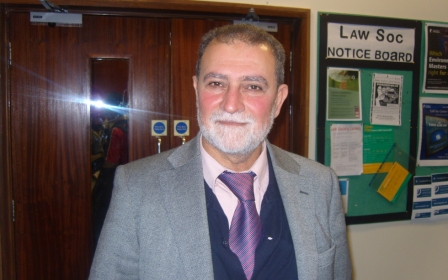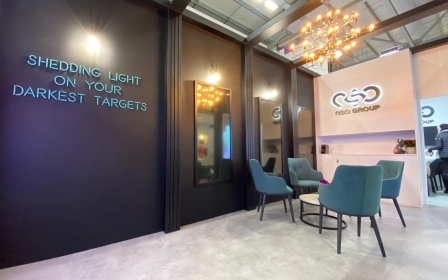Pegasus spyware: Dissident launches lawsuit against NSO Group and Bahrain

A prominent Bahraini activist and blogger is the latest UK-based Arab dissident to take legal action against the NSO Group over allegations that his phone was hacked with Pegasus.
Lawyers for Yusuf al-Jamri have sent letters to the Israeli firm and the Bahraini embassy in London marking the first steps in legal proceedings after claiming that the Bahraini government had infiltrated Jamri's phone with the military-grade spyware in August 2019.
In a statement on Tuesday, Jamri said that after being physically and psychologically tortured by the Bahraini government, he had felt safe in the UK where he was granted asylum in 2018 and has never since travelled abroad.
"I thought the Bahraini authorities would not harm me further, until they hacked my iPhone," he said.
'I thought the Bahraini authorities would not harm me further, until they hacked my iPhone'
- Yusuf al-Jamri, Bahraini activist
"The Bahraini regime would not be able to commit this crime and violate my privacy without the tools provided to them by the NSO Group. I am determined to hold them both accountable so that I can protect myself and prevent others from suffering the same fate.”
New MEE newsletter: Jerusalem Dispatch
Sign up to get the latest insights and analysis on Israel-Palestine, alongside Turkey Unpacked and other MEE newsletters
Jamri became politically active following the 2011 uprisings in the kingdom and across the Arab world and participated in the pro-democracy protests, according to the Bahrain Institute for Rights and Democracy (BIRD), which has advised him for years.
In August 2017, BIRD says he was summoned by Bahrain's National Security Agency for questioning after he posted on social media about a report by the British Foreign Office criticising Bahrain's human rights situation.
During the proceeding interrogation, he was allegedly tortured, including being beaten up, sexually assaulted and threatened with rape.
Once released, he posted a video message to King Hamad bin Isa Al Khalifa saying that he had been tortured during the interrogation. Bird says he was immediately summoned again to the agency.
Within weeks of his final summons, Jamri and his family fled to the UK where he has continued to use social media to raise awareness about human rights and politics in Bahrain.
"Yusuf has undertaken a heroic action by taking on both the Bahraini government and NSO Group and starting the process of launching a lawsuit against them, despite the grave risk of reprisals for himself and those close to him," said Sayed Ahmed Alwadaei, advocacy director for Bird.
"It is the right decision to take."
Legal action in UK
An analysis of Jamri's phone suggests that the infiltration started after he tweeted about a Bahraini protester, Moosa Mohammed, who had climbed onto the roof of the Bahraini embassy in London and was allegedly assaulted by embassy staff in late July 2019.
Earlier this year, Mohammed and Saeed Shehabi, another Bahraini activist in the UK, asked London's High Court to allow their own legal action over spyware claims against the Bahraini government and the UK-German company Gamma Group.
They claim that Bahrain infected their computers with Gamma Group's FinSpy in 2011, several months after anti-government protests had started in the kingdom. They are still awaiting a decision from the court.
Four other UK-based Arab dissidents have also taken legal action this year against NSO Group, Saudi Arabia and the United Arab Emirates over allegations that they were targeted with Pegasus.
Claimants in that legal action brought by the London-based Bindmans law firm and the Global Legal Action Network, who are also representing Jamri, have previously told MEE that they too have questioned how safe they are in the UK following the alleged infiltration of their devices.
Their fears, they said, have been compounded by the British government’s muted response to their attacks, a lack of follow-up from any UK law enforcement agency and reports that Downing Street and the Foreign Office were infected with Pegasus in recent years.
“We all have the right to feel safe in our homes and in our adopted countries," Monika Sobiecki, a partner at Bindmans, said on Tuesday.
"The complacency of world governments in failing to reign in or even regulate intrusive surveillance spyware in the face of the evidence emerging from Pegasus spyware litigation globally is deeply concerning.”
MEE has sought comment from the Bahraini embassy in London and the NSO Group.
A Bahraini government spokesperson told The Guardian that the kingdom would "continue to comply with the rule of law and all its international legal obligations. Freedom of expression is a constitutional right and no one is detained because of their political views or activism.
"The government of Bahrain does not tolerate mistreatment of any kind and has put in place internationally recognised human rights safeguards, including the establishment of independent bodies to conduct investigations and undertake periodic inspections of prison conditions and inmates’ welfare," the spokesperson was quoted as saying.
NSO Group told The Guardian: “NSO is a software provider. The company does not operate Pegasus, has no visibility into its usage, and does not collect information about customers or who they investigate.”
Middle East Eye delivers independent and unrivalled coverage and analysis of the Middle East, North Africa and beyond. To learn more about republishing this content and the associated fees, please fill out this form. More about MEE can be found here.





